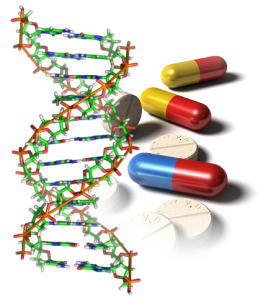 The more I learn about Pharmacogenomics the more it makes sense. Having worked in the Pharmaceutical industry for nearly 35 years I heard very little about Pharmacogenomics until recently. This is all about using the patient’s history, including genetic variants, to make clinical decisions. As a patient builds their own Personal Health Record to include behaviors, environments and health history the provider, including the pharmacist, becomes better armed to customize therapy. I totally support the consumer owning and managing their own personal history. Today’s dynamic dictate the PHR becomes portable. Together the patient and provider can optimize a successful treatment pathway.
The more I learn about Pharmacogenomics the more it makes sense. Having worked in the Pharmaceutical industry for nearly 35 years I heard very little about Pharmacogenomics until recently. This is all about using the patient’s history, including genetic variants, to make clinical decisions. As a patient builds their own Personal Health Record to include behaviors, environments and health history the provider, including the pharmacist, becomes better armed to customize therapy. I totally support the consumer owning and managing their own personal history. Today’s dynamic dictate the PHR becomes portable. Together the patient and provider can optimize a successful treatment pathway.
Let’s talk about the cost of Adverse Drug Reactions. Why you may ask? The costs of ADR’s are staggering at over $135 Billion, above Cardiovascular of Diabetic care (https://1.usa.gov/1aMxw1M). Addressing the ADR’s has to be a top priority to eliminate unnecessary costs. ADR’s cause injuries or deaths in 1 of 5 hospital patients. There are over 2 million serious ADR’s yearly and over 100,000 deaths annually. The ADR rate for nursing home patients is 350,000 per year. There are over 3 billion outpatient prescriptions per year. Before Medicare Part D was implemented, over half of the Medicare patients took prescriptions written by 2 or more doctors, which can be a problem. ADR’s increase exponentially if a patient is taking 4 or more prescriptions. Drug interactions represent 3-5% of preventable in-hospital ADR’s.
Pharmacogenomics provides an ideal opportunity to tackle the ADR problem. We know genetic variants account for how individuals respond to drugs. Enzymes responsible for drug metabolism and proteins that determine cellular response to drugs function according to genetic makeup or genotype. The most common gene that influences drug metabolism and response is the Cytochrome P450 gene. The point I am trying to make is that genetic variants can lead to poor drug response or an adverse drug reaction. These key differences in enzymes can alter signaling mechanisms or cellular machinery resulting in side effects that prevent continued use of the drug.
So we now see genetic testing as a key tool in the provider’s armamentarium to treat their patients more effectively. The role of the pharmacist has become ever so important in the team approach in managing an Individualized Pharmacotherapy Program. Keep in mind we are talking about drugs that are used in both acute and chronic treatments, including statin therapy, anti-coagulation, anti-platelet therapy and pain management, just to name a few. Genetic testing companies should provide a wallet card for the patients DME (drug metabolizing enzyme) genotype panel. This information reduces any trial by error dosing. Patients will appreciate not having to be re-hospitalized. Hospitals will also be appreciative not having to deal with reduced payments due to readmissions.
Pharmacogenomics provides an exciting area for change in patient care. Pharmacogenetic testing needs to become a standard of care. The test is a one-time test and can be an invaluable piece of information in making the right decision. This can save a patient’s life and can keep the patient out of the hospital. Another key point is the existence of the YouScript.com software. This proprietary software takes the drug-drug, drug-gene and polypharmacy interactions into an easy to understand, clinically actionable format.
This Guest Post was contributed by Kim Kersten who can be contacted at 707-426-4580 or @genescript.





